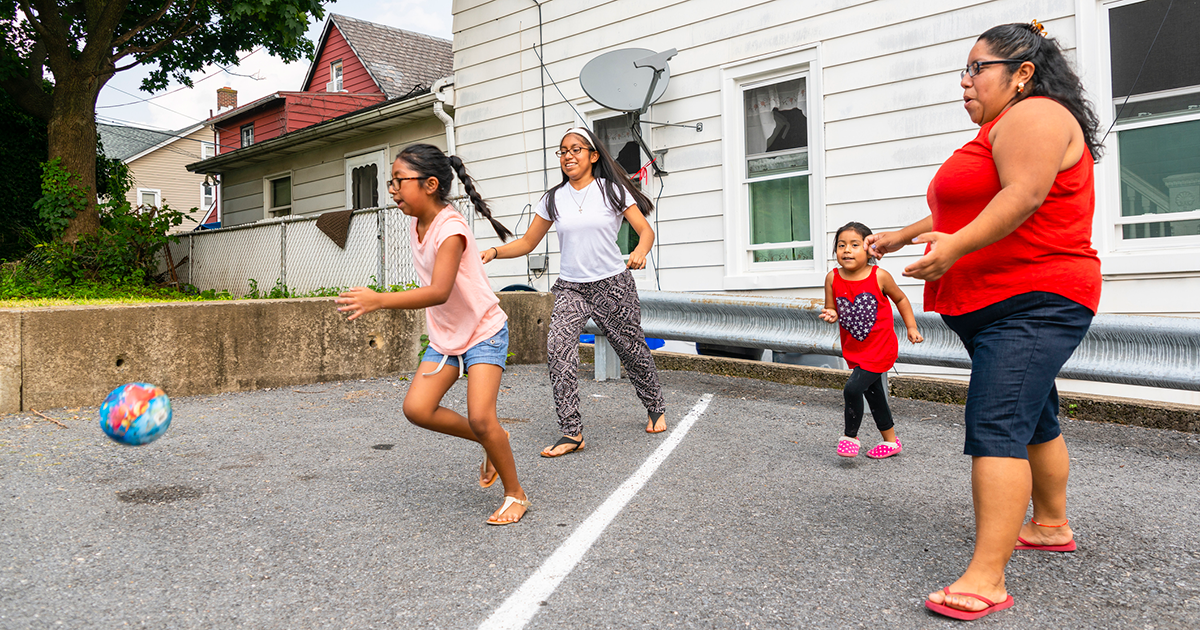Climate change is caused by pollution from power plants, cars, trucks, buses, and other human activities. The gases that get released when coal, natural gas, oil, and other fossil fuels are burned are making the Earth warmer. Because of this, extreme heat days are becoming more frequent and more intense. Heat can be dangerous for our health, triggering heat-related illnesses and making existing health problems worse. The Latino community is especially vulnerable to the impacts of extreme heat.

Outdoor workers:
With over 60 million Hispanics living in the US, the Hispanic community makes up nearly one-fifth (18.4%) of the total US population.1 Hispanic or Latino individuals are disproportionately represented in the outdoor workforce, which includes farm workers, construction workers, first responders, and utility workers who make sure our day-to-day lives run smoothly. In the US, there are approximately 3 million farm workers who plant and harvest the food that goes in the meals we eat. Exact estimates vary, but according to the National Center for Farmworker Health, around 80% of farm workers self-identify as Hispanic.2 Extreme heat puts these workers at risk in multiple ways.
Health impacts from heat:
Working outdoors in extreme heat can be unsafe. Extreme heat exposure can cause serious heat-related illnesses, like heat exhaustion and heat stroke. Without emergency treatment, heat stroke can cause permanent disability or death.3 Extreme heat has also been linked to increased hospital admissions for respiratory and heart problems.4
Higher risk of premature death: Outdoor workers in the US are up to 35 times more likely to die from heat exposure than the general population.5
More unsafe workdays: As extreme heat days become more frequent and intense, there will be more time when outdoor work is unsafe. By 2050, with slow or no action to reduce greenhouse gas pollution, there could be three to four times as many days with a heat index (the “feels like” temperature) above 100°F.6
Lost earnings and amplified inequity: An analysis by the Union of Concerned Scientists estimates that by 2050, more than 7 million US workers could lose 10% or more of their earnings each year because of extreme heat without action to reduce global greenhouse gas pollution. Wage losses due to extreme heat could amplify existing racial inequities in poverty rates, health outcomes, and economic mobility.7
Vulnerable child farm workers: The Association of Farmworker Opportunity Programs estimates that there may be up to 500,000 child farmworkers in the US,8 as young as age 10.9 Children are especially vulnerable to heat-related illnesses.10 A 2020 study of child farm workers in North Carolina found that 48% had experienced a heat-related illness in the last 12 months.11

Pregnancy
Pregnant people and their babies are more vulnerable to the health impacts of extreme heat. Extreme heat increases the risk of pre-term labor, low birth weight, and pregnancy loss.12 Poverty and language barriers can make it difficult for Latina mothers to access needed medical care.13 A 2005 study found that only 42% of agricultural workers accessed first-trimester prenatal care, compared to 76% nationally.14
Urban heat islands
Hispanics are 21% more likely than the non-Hispanic white population to live in urban heat islands,15 which are urban areas that tend to be much warmer than surrounding rural areas. Urban areas have lots of asphalt and concrete, which absorb heat, and at the same time tend to have fewer trees and other vegetation, which provide shade and cooling. Urban heat islands can be up to 22°F hotter than surrounding suburban and rural areas.16
Disrupted learning for children
Hispanic children experience unfair learning disruptions when temperatures rise. A 2020 study looked at 270 million exam scores of US students between third and eighth grades. Researchers found that Black and Hispanic students were far more likely than white students to have significantly lower test scores than white students on days when temperatures were above 80°F.17
Health care access
Hispanics are more likely to lack health insurance compared to other racial groups. In 2019, 16.7% of Hispanics were uninsured, compared to only 5.2% of non-Hispanic whites.18 Lack of insurance coverage means that Hispanic communities have less access to important health care to treat and prevent illnesses that can be triggered or exacerbated by extreme heat.

Make your voice heard
You can urge your lawmakers to support policies that protect Latinos and others from the growing threat of extreme heat. You can also advocate for laws and policies that reduce the greenhouse gas pollution causing climate change. Better laws and policies that will help us move toward the large-scale solutions we need.
Advocating for the health of the Latino community is important work. Remember that your elected representatives at all levels of government work for YOU!
Find out who your government representatives are at www.usa.gov/elected-officials. Then, pick up the phone or write an email to your elected officials letting them know why climate change, extreme heat, and the health of the Latino community matter to you. Your voice matters.
Join Moms Clean Air Force to learn more about climate change and what you can do. Through our Latino outreach program, EcoMadres, we advocate for the health of Latino children and families.

A note on language
Though there is strong overlap between the terms “Latino” and “Hispanic,” they are not exactly the same, and the way that Latino and Hispanic individuals describe themselves is not universal or static. Here, the term “Hispanic” is used when citing specific research that uses this term. “Latino” is used in all other circumstances.
Read this fact sheet in Spanish here.
Full list of sources.
Released: July 2022




